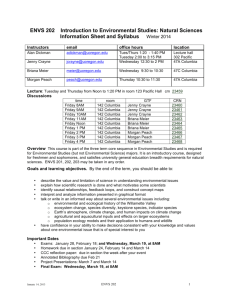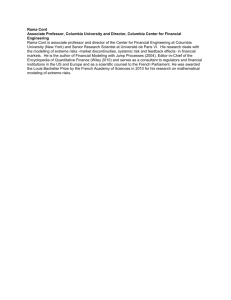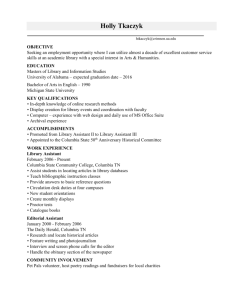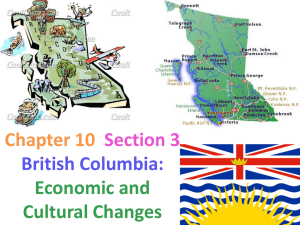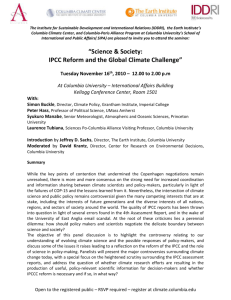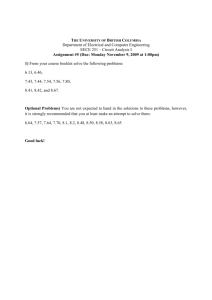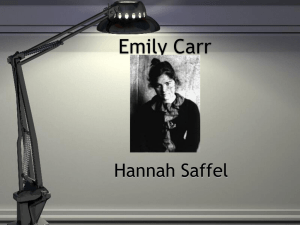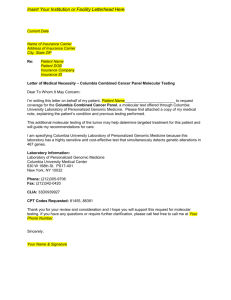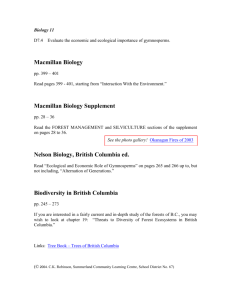ENVS 202 Syllabus 2012 - Environmental Studies Program
advertisement
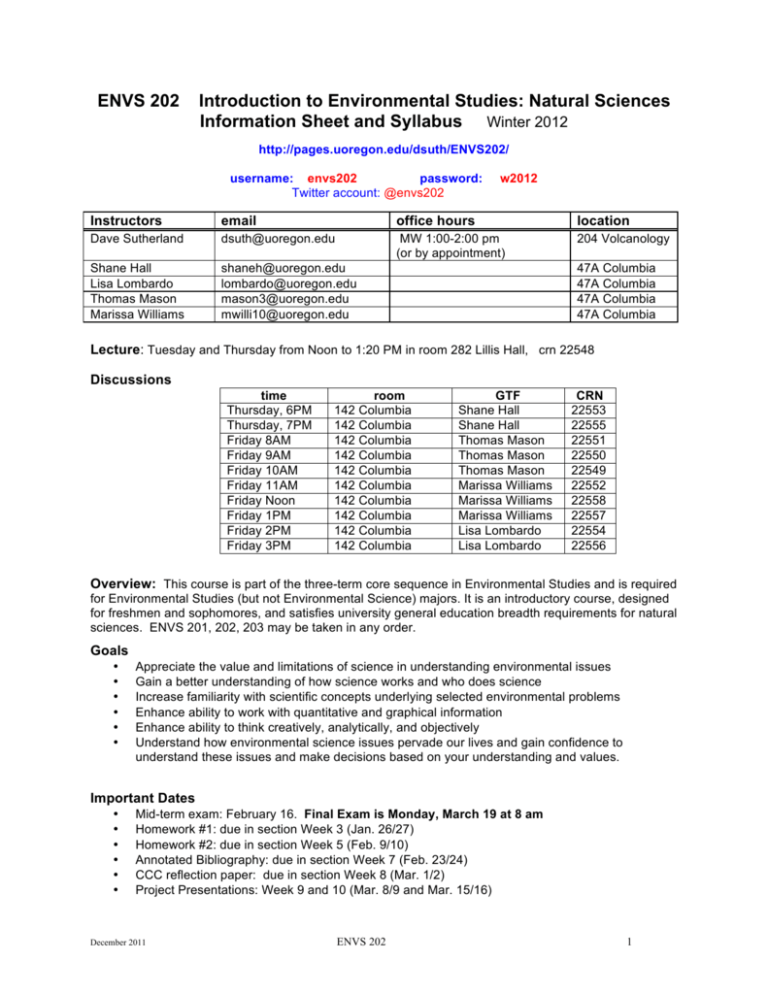
ENVS 202 Introduction to Environmental Studies: Natural Sciences Information Sheet and Syllabus Winter 2012 http://pages.uoregon.edu/dsuth/ENVS202/ username: envs202 password: Twitter account: @envs202 w2012 Instructors email office hours location Dave Sutherland dsuth@uoregon.edu MW 1:00-2:00 pm (or by appointment) 204 Volcanology Shane Hall Lisa Lombardo Thomas Mason Marissa Williams shaneh@uoregon.edu lombardo@uoregon.edu mason3@uoregon.edu mwilli10@uoregon.edu 47A Columbia 47A Columbia 47A Columbia 47A Columbia Lecture: Tuesday and Thursday from Noon to 1:20 PM in room 282 Lillis Hall, crn 22548 Discussions time Thursday, 6PM Thursday, 7PM Friday 8AM Friday 9AM Friday 10AM Friday 11AM Friday Noon Friday 1PM Friday 2PM Friday 3PM room 142 Columbia 142 Columbia 142 Columbia 142 Columbia 142 Columbia 142 Columbia 142 Columbia 142 Columbia 142 Columbia 142 Columbia GTF Shane Hall Shane Hall Thomas Mason Thomas Mason Thomas Mason Marissa Williams Marissa Williams Marissa Williams Lisa Lombardo Lisa Lombardo CRN 22553 22555 22551 22550 22549 22552 22558 22557 22554 22556 Overview: This course is part of the three-term core sequence in Environmental Studies and is required for Environmental Studies (but not Environmental Science) majors. It is an introductory course, designed for freshmen and sophomores, and satisfies university general education breadth requirements for natural sciences. ENVS 201, 202, 203 may be taken in any order. Goals • • • • • • Appreciate the value and limitations of science in understanding environmental issues Gain a better understanding of how science works and who does science Increase familiarity with scientific concepts underlying selected environmental problems Enhance ability to work with quantitative and graphical information Enhance ability to think creatively, analytically, and objectively Understand how environmental science issues pervade our lives and gain confidence to understand these issues and make decisions based on your understanding and values. Important Dates • • • • • • Mid-term exam: February 16. Final Exam is Monday, March 19 at 8 am Homework #1: due in section Week 3 (Jan. 26/27) Homework #2: due in section Week 5 (Feb. 9/10) Annotated Bibliography: due in section Week 7 (Feb. 23/24) CCC reflection paper: due in section Week 8 (Mar. 1/2) Project Presentations: Week 9 and 10 (Mar. 8/9 and Mar. 15/16) December 2011 ENVS 202 1 Dates 10-Jan Lecture (see website for assigned readings) 1. What is Environmental Science? 12-Jan week 1 2. Environmental History of the PNW Service opportunities, MLK 17-Jan 3. Evolution and Ecology of Salmon Jennifer Geller, TLC 4. Salmon and Ecosystem Change Form project groups/topics Find and evaluating resources Bring a laptop if possible 5. Ecosystem Health and Restoration Rob Hoshaw, Long Tom - confirm 6. Biodiversity: definitions and measurement. Keystone and indicator species Biodiversity indices Ecosystem health indices Bring a calculator 19-Jan week 2 24-Jan 26-Jan week 3 31-Jan Assignments/Tests Introductions Project topic brainstorming Bring a laptop if possible Homework 1 due in section 7. Biodiversity: invasive species; diversity, productivity, resilience, stability (Cane toads) 2-Feb week 4 8. Marine reserves; marine biodiversity; marine habitats; marine invasives, oceanography Kelly Sutherland, UO Biology/OIMB 7-Feb 9. Atmosphere and Climate Basics 9-Feb week 5 Section Activity Discussion / Debate Should we attempt to eradicate invasive species? Homework 2 due in section 10. Climate Change and Climate Research; Test taking Tips Mark Carey, UO CHC 14-Feb 11. Midterm (L1-10) Midterm covering Lectures 1-10 16-Feb week 6 12. Energy resources and use; renewables in OR/PNW; 21-Feb 23-Feb week 7 13. Agricultural Resources: soil and water Alan Dickman, UO ENVS director 14. Sustainable Agriculture Devon Bonady, UO ENVS 28-Feb 15. Fertilizers and Pollution; water quality 1-Mar week 8 16. Population Ecology models 6-Mar 17. Population Ecology applications 8-Mar week 9 18. Wildlife Population Ecology Nelson Ting, UO ANTH 13-Mar 19. Current Environmental Issue(s), What's in the news? Carbon in the atmosphere Bring a laptop if possible Bioswales/eco-features campus tour Mark recapture method of population estimation Annotated Bibliography due in section presentation plans (in groups) CCC reflections shared CCC Reflection Paper due in section Final touches on presentations Project Presentation Session I 15-Mar week 10 Presentations 20. Hope and Optimism, review session for final exam 19 March, Monday at 8 am **** December 2011 Project Presentation Session II Presentations Final Exam week ENVS 202 2 Grading Criteria and Philosophy If you get 90% or more of the total possible points, you will receive a grade of A- or higher; if you get 80% or more you will receive a grade of B- or higher; 70% or more a grade of C- or higher. What does this mean for you? If you do excellent work (in our judgment) you will get an A, good work earns a B, satisfactory work earns a C. Course grades are based on performance, not on effort, but it is rare that anyone who comes to class regularly, does the reading, and puts a serious effort into studying doesn’t pass. Please note that if you take the class P/N you must get at least a C- to pass. The number of points needed for a given grade (e.g. the C- cutoff) may be lowered, but will not be raised. Courses applied to the Environmental Studies major and minor must be taken for a letter grade. Course component Midterm Final Exam Homework (9% each) Term Project (10% each for bibliography and presentation) CCC project and write-up Participation Total Percent of total grade 20% 25% 18% 20% 10% 7% 100% Classroom Conduct. Please read this syllabus carefully and talk to Dave or to your GTF as soon as possible if you have questions about what is expected or how you will be graded. We expect everyone to follow University rules and guidelines for behavior. Academic dishonesty, which includes cheating and plagiarism, is a serious offense and will be treated according to the guidelines in the Student Conduct Code (located at http://studentlife.uoregon.edu) This doesn't mean you shouldn't talk with other students about what you are thinking or writing; it does mean that when you write something, it should be in your own words, not copied from someone else. We ask that everyone do their best to be intellectually honest while also being respectful of personal differences. We welcome and encourage intellectual controversy-- it is essential to real learning. At the same time, we ask that everyone respect the rights of others to hold different opinions, even as we challenge the ideas supporting those opinions. The grade you earn will be a reflection of the quality of work you have done, but not of you as a person, nor of the values you hold. Out of respect for other students, you should plan to arrive at class on time and stay until class is over. If, on occasion, you do arrive late, please be considerate of others and enter in such a way that you don't disturb other students. If you need to leave early, please sit near an exit so that you can leave without disrupting the class. We ask that you not interfere with the ability of other students to learn by making noise when others (instructors or classmates) are speaking or working. Cell phones should not be used in class. Failure to follow these guidelines may lead to a lowered participation score. If you have a documented disability and anticipate needing accommodations in this course, please make arrangements to meet with Dave or your GTF soon. Please request that the Counselor for Students with Disabilities send a letter verifying your disability. Crises happen. If you are having problems that are interfering with your ability to do the work in this class, please let us know promptly. We are willing to make special arrangements when the need is real and when you have done your best to deal with the situation in a timely manner. The University of Oregon Crisis Center, a student funded organization, provides students with confidential telephone crisis intervention 24 hours a day, 7 days a week. The hotline number is 346-4488. Students often believe that their issues are not “severe” enough for them to call a crisis intervention hotline. At the Crisis Center, there is no problem too small. Discussion Sections: Discussion sections help you to practice important skills, such as public speaking, respectful and active listening, considering and evaluating other people's viewpoints, and formulating your own viewpoints. Attendance will be taken for the discussion sections and will count December 2011 ENVS 202 3 towards your participation grade. You must attend the section for which you are registered. Homework and other class assignments will be turned in, discussed, and returned in discussion section. Readings: Assigned readings from current journal articles will be made available in pdf format or web links on the course website. There is no assigned textbook, but you might find it useful to consult one of a variety of environmental science texts available such as Botkin & Keller, Environmental Science. Participation: Seven percent of your grade is attributed to participation. Attendance and active involvement in sections are primary ways to earn participation points. Participation is not simply measured by how vocal you are, however. Other ways to participate include sharing pertinent journal articles, public talks, television shows, etc—we'll talk in class about a course Twitter account (see below). Missing class (lecture or discussion), arriving late, leaving early, or not participating fully (e.g. talking, surfing the web, texting) will lead to a reduction in your participation grade. Several times during the term we will have guest scientists come to talk about their work and their views of science. These are important parts of the course that cannot easily be made up. Don’t miss these and above all, don’t tune out or leave when a guest comes to talk to us. Homework: Sixteen percent of your grade comes from written homework assignments. You can think of these as take-home exams of sorts, worth 9% each. It is acceptable to talk to others about the homework, but you must write your own answers. The homework is also intended to help to prepare you to do well on the in-class exams. Homework is due at the start of your discussion section; we will not accept late work. Answers to most homework questions will be posted after the last discussion section meets but before the exam. Exams: Exams will often ask you to apply, synthesize, or evaluate information. This is harder than simply recalling facts. Make-up exams will not be given, so note the dates of the exams carefully and don’t make plans to be out of town on any of those dates. The final exam will be cumulative. Notice that the final exam is scheduled for Monday of finals week (at 8AM!) and cannot be taken earlier or later. Term project: The term project allows you to explore a particular issue in more depth. There are two components to the project: an annotated bibliography done individually, and a presentation to your classmates done in groups of three. A separate handout will describe the project more fully. Classroom Community Connection (CCC): This project is designed to place you in the community to see how one of the topics we are learning about is applied in the real world. You will do a short service project (part of a day) and write a reflection paper about your work and its relation to environmental science concepts. A separate handout will provide details. Course Web page: Most course information will be on a website located at http://pages.uoregon.edu/dsuth/ENVS202/ Twitter: @envs202, I'll be tweeting pertinent links to the course here, and would love you to share/reply with environmental science-y links to this account as well. Blackboard: may be used for important announcements or for information posted by your GTF. How to do well in this course: • • • • • • Attend all class functions (lectures and discussions), arrive on time, and stay engaged. Do the assigned reading in advance or at least skim through the material so that you know what is there and can go back and read in more depth on your own. Make use of the course web page and the lecture notes and outlines on it, but do not try to use these as a replacement for attending class. You will not succeed in this class if you don’t attend regularly. Ask questions. Get together with someone else in the class at least once a week to study. Keep the big picture in mind by asking yourself how what you are learning is important to your life. If it isn't apparent, then ask. Read magazines, the newspaper, and listen to radio or television for relevant ideas. Don’t believe everything you hear or read. Be able to back up your opinions with credible evidence and good logic. December 2011 ENVS 202 4
